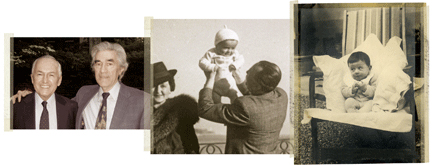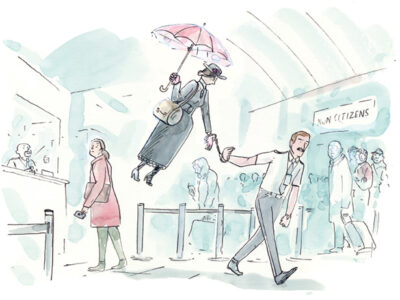
Two chance meetings, 70 years apart.
by Steven A. Heller and Gino Segre
Hi, I Don’t Believe We’ve Met. I’m Steven.
It happened at a book signing and dinner in Philadelphia. My wife, Peggy, and I had been invited by a dear friend and author, and sat next to another couple we didn’t know. I introduced myself.
Gino Segre was distinguished-looking and about my age. After exchanging pleasantries, I inquired about his profession. He replied that he had been a professor of physics and astronomy at Penn for 40 years. Now that we had the University in common, I told them my only physics story.
Under the direction of J. Robert Oppenheimer, I began, the Manhattan Project to design and build the atomic bomb had three Hungarians who played prominent roles in the bomb’s development: Edward Teller, Leo Szilard, and Eugene Wigner—a relative of mine who was later a physics professor at Princeton. According to Teller’s obituary, the three were in a conference room at Chicago’s Stagg Field with Enrico Fermi, another of the bomb’s principals. When Fermi excused himself to go down the hall, Szilard then told Teller and Wigner, “Now that Fermi has stepped away we can speak in Hungarian.”
To me, this charming tale has always illustrated how Hungary—where I was born—made a contribution far out of proportion to its small size to the brainpower needed to win the war.
Gino asked me when I had come to the US. I told him that we arrived in May of 1939, to see the World’s Fair in New York and wait for the gathering storm in Europe to pass. Gino said that he and his family had come in May 1939 as well—and also to see the World’s Fair. Peggy then mentioned that I’d come over on the Rex, an Italian liner, boarding the ship in Cannes. To everyone’s surprise, Gino said he’d also come on the Rex, having boarded in Genoa.
There was a moment of disbelief. We compared our ages and discovered them to be just months apart. Gino then inquired whether my mother spoke foreign languages. I told him that in addition to Hungarian, she spoke German, French, and English. Gino’s mother, who was German-born, was also fluent in French, of course in German, and knew some English as well. We concluded that there was a high probability that our mothers, with infant sons, had known each other on board the ship.
We also discovered another link. My relative, Eugene Wigner, and Gino’s uncle, Emilio Segre, had worked together on the atom bomb and each had gone on to win a Nobel Prize in physics.
Later I asked Gino to fill in some of the details of his journey, and he wrote me a letter.
Pleased to Meet You … Again.
Since the party where I met Steven was for a member of my wife Bettina’s book club—not someone we had ever socialized with—I had complained that I wouldn’t know anybody. But she assured me, “Of course you will.” How right she was!
The circumstances that led to my family’s departure from Italy in 1939 were political. As Mussolini and Hitler drew increasingly closer in the late 1930s, a series of laws discriminating against Jews were rapidly passed in Italy and my father was dismissed from his post as a university professor in 1938. It was becoming increasingly clear that emigration was going to be a wise decision. In early 1939 my father therefore went to the United States consulate in Florence to obtain visitor’s visas for the family—immigrant visas were completely unavailable. My father was always someone who couldn’t resist making a joke even when it would have been better to remain silent. When the consul said to him, “Isn’t your son Gino a little young for appreciating the World’s Fair?”—I was only four months old—my father replied, “You know little Jewish boys get smart very young these days.” Fortunately the consul laughed and gave us the visas, knowing full well we might not be coming back to Italy soon if we could help it. And we didn’t return until eight years later.
And so it was that my parents, my older brother, Joseph, and I boarded the Rex on the morning of May 3, 1939. It sailed from Genoa at 11:30, from Cannes at 4:20 in the afternoon, from Naples at 12:20 the next morning, from Gibraltar on the morning of the 6th, and arrived in New York on the morning of May 11th.
I know all this because when I told my brother about meeting Steven, he went through some old family papers and found the passenger list for the sailing, and there we all were. There were apparently only 83 passengers on the Rex in first class for that sailing, despite a capacity for over 600, and, as far as I can determine, only two were infants, Gino and Steven. The low number of passengers surprised me since I had always thought ships to the United States were packed with refugees in 1939, but I am quite sure the list is accurate since it is full of details, including the weather every day.
Though Steven and I have crossed the Atlantic many times since then, if never again together, I am quite sure we have not done so in settings that were as luxurious as our first one—even if the view from our baby carriages was probably limited. It is miraculous that we met after 70 years. I am only sorry we had to wait so long.
As for the Rex, the flagship of the Italian Line and its pride both for its luxurious Art Deco furnishing and for being the record-holder for speed in Atlantic crossings, it was sunk near Venice by British fighter planes on September 8, 1944.
Pen Pals
Gino’s letter spurred recollections of my own family’s emigration story. My parents’ decision to travel to New York was not made easily. My uncle, George Spitzer, was already in London working with the Warburg banking family. From his vantage point he could more clearly see Hitler’s intentions and the likelihood of war. He urged my father to leave Hungary with his young family. Budapest in the 1920s and 30s was a cosmopolitan, cultivated, and cultured city; my family had a charmed way of life. Although my father had visited the US in 1927, and had a very positive impression, he was not inclined to move here. (His travels around the country had included a visit to Philadelphia to see the two massive paintings by the Hungarian artist Mihaly Munkacsy, which had been purchased by John Wanamaker for display in the Center City store. Since they were only exhibited during the holiday season, when my dad explained to the curator that he had come from Budapest to see them, he was taken to the vault to admire the paintings.)
Because my uncle persisted, my father agreed that the family would leave Budapest for the summer to see the World’s Fair in New York. We traveled to the south of France to secure passage on the Rex. It was not a simple matter. There was suspicion in the US at the time that spies and enemy aliens were infiltrating the country. When the Italian Line’s booking agent notified us that he was having difficulty securing visitor’s visas, my father indicated he would cancel the five reservations for the crossing. The agent, fearing the loss of five paying passengers, prevailed upon the consulate to reconsider, and, fortunately for us, the visas were approved.
On September 1, 1939, about three months after we arrived in New York, Hitler marched into Poland. My uncle had probably saved our lives. He and my grandparents joined us in New York prior to the start of hostilities. Our younger son, George, is named in his memory.
Although we always had the intention of returning to Budapest, after the ravages of the war and the Communist takeover of the country, it was no longer home. I can still vividly recall my father, throughout the war, saying a prayer after the dinner meal for Franklin Roosevelt, Winston Churchill, and Joseph Stalin, and for the allies to prevail.
Gino subsequently sent me a copy of his book, Faust in Copenhagen: A Struggle for the Soul of Physics, with the following inscription: “To my ‘oldest’ playmate, Istvan [Steven in Hungarian] with fond memories of the A deck. Warmly, Gino.”
I prize the book and sentiment. It has a special place in my library. My thank-you note was on a card showing a reproduction of the original Rex transatlantic poster.
Steven Heller W’61 WG’77 is executive vice president at Seiden Krieger Associates, in New York. Gino Segre is emeritus professor of physics and astronomy at Penn; his most recent book, Ordinary Geniuses: Max Delbruck, George Gamow and the Origins of Genomics and Big Bang Cosmology, was published in August.




